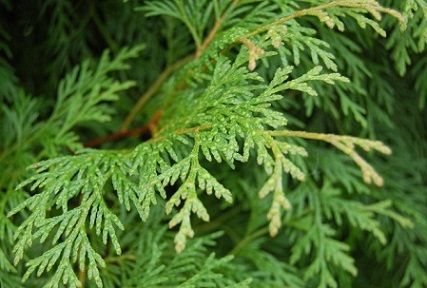Herbs And Phytochemicals: Essential Oils From Calocedrus Formosana Have Anticancer Properties Against Colon Cancer Cells By Targeting SIRT1
Nikhil Prasad Fact checked by:Thailand Medical News Team Feb 27, 2024 1 year, 1 month, 4 weeks, 4 hours, 53 minutes ago
Herbs And Phytochemicals: Cancer remains a global health challenge, with colorectal cancer (CRC) being one of the most prevalent and deadly forms. Despite advances in treatment options, the aggressive nature and chemoresistance of CRC pose significant challenges to effective therapy. Recent attention has turned towards natural compounds with anticancer properties, and essential oils derived from Calocedrus formosana (CF-EOs) have shown promise in various applications, including anti-termite, antifungal, anti-mosquito, and antimicrobial activities. This
Herbs And Phytochemicals news report delves into the molecular intricacies of how CF-EOs exhibit anticancer effects against colon cancer cells, specifically targeting SIRT1.
 Calocedrus formosana
Colorectal Cancer Landscape
Calocedrus formosana
Colorectal Cancer Landscape
The World Health Organization identifies cancer as a leading cause of global mortality, with colorectal cancer contributing significantly to this burden. In the United States alone, over 100,000 new cases and 50,000 deaths from colorectal cancer were reported in 2022. Despite a slight decrease in overall CRC rates, the incidence in individuals under 50 years increased, highlighting the need for innovative therapeutic approaches. Chemotherapeutic resistance and high mortality rates further emphasize the urgency for effective treatments in advanced-stage CRC.
Natural Compounds in Cancer Therapy
In the pursuit of effective cancer treatments, natural compounds have gained attention through extensive research and screening programs. Approximately 25% of cancer chemotherapeutics are derived directly from plants, and natural compounds have demonstrated anticancer properties across various cancer types. The complex interplay between apoptosis and autophagy, crucial processes in cellular homeostasis, is being explored for their roles in preventing and treating cancer.
Essential Oils and Their Diverse Biological Activities
Essential oils, volatile mixtures derived from plants, have emerged as compounds with diverse biological activities. Calocedrus formosana, also known as Taiwan incense cedar, has been associated with antibacterial, antifungal, anti-termitic, and anti-melanogenic properties. This study focuses on CF-EOs and their potential in CRC treatment, exploring their impact on autophagy and apoptosis in colon cancer cells.
Identification and Composition of CF-EOs
Calocedrus formosana essential oils (CF-EOs) were extracted from the heartwood of C. formosana, demonstrating a yield of 2.01% (w/w). Chemical composition analysis revealed 24 identifiable compounds, with shonanic acid, chaminic acid, and thujic acid isolated and purified. The major components, including shonanic acid (34.86%), thujic acid (10.2%), and chaminic acid (10.06%), collectively accounted for 74.22% of CF-EO content.
Inhibition of Colon Cancer Cell Proliferation by CF-EOs
Utilizing HCT116 wild-t
ype (wt) and p53-null colon cancer cells, the anti-proliferative effects of CF-EOs were assessed. Dynamic cell impedance measurements and MTT cell viability assays demonstrated a significant decrease in cell growth with CF-EO treatments at concentrations of 10, 20, and 50 µg/mL. Notably, non-tumorigenic epithelial cells showed no significant anti-proliferative response to CF-EOs.
Induction of ROS-Mediated Autophagy by CF-EOs
CF-EOs at 20 and 50 µg/mL were found to induce reactive oxygen species (ROS) generation and autophagy in both HCT116 p53-wt and p53-null cell lines. The use of ROS scavenger N-acetyl cysteine (NAC) attenuated these effects, indicating a ROS-dependent mechanism. CF-EOs triggered apoptosis at 50 µg/mL, supported by the upregulation of apoptotic markers and autophagy markers, including ULK1, Atg5, Atg6, Atg7, and the conversion of LC3-I to LC3-II.
Targeting SIRT1 for Apoptosis Induction
The study revealed that CF-EOs inhibited the activity and expression of the NAD+-dependent deacetylase SIRT1, leading to increased levels of acetylated p53 (Ac-p53) in p53-wt cells and acetylated c-Myc (Ac-c-Myc) in p53-null cells. The suppression of SIRT1 by CF-EOs also enhanced the acetylation of ULK1, triggering ROS-dependent autophagy in colon cancer cells. These findings suggest a dual mechanism involving both apoptosis and autophagy in the anticancer effects of CF-EOs.
Exploring the Molecular Events of SIRT1 Degradation
To unravel the molecular events associated with CF-EO-induced cell death, the study examined SIRT1 expression and its relationship with CRC prognosis. High SIRT1 expression was associated with poor relapse-free survival in colorectal cancer patients. CF-EOs were found to dose-dependently inhibit SIRT1 activity and protein expression. Autophagy and proteasome pathways were identified as contributors to CF-EO-mediated SIRT1 degradation.
Implications and Future Directions
In conclusion, essential oils isolated from Calocedrus formosana demonstrate significant anticancer potential against colon cancer cells by targeting SIRT1, inducing ROS-mediated autophagy and apoptosis. The dual mechanism suggests a comprehensive approach to cancer treatment. As natural compounds continue to garner interest in cancer therapy, CF-EOs present a promising avenue for further exploration. Future studies may involve comparing CF-EOs with reference compounds, assessing synergistic effects with known therapeutic agents, and advancing preclinical investigations for potential clinical applications. The intricate molecular insights provided in this study pave the way for a deeper understanding of the therapeutic potential of essential oils in colorectal cancer management.
The study findings by the researchers from National Chung Hsing University, Taichung-Taiwan and the China Medical University, Taichung-Taiwan were published in the peer reviewed journal: Antioxidants.
https://www.mdpi.com/2076-3921/13/3/284
For the latest on
Herbs And Phytochemicals, keep on logging to Thailand Medical News.
